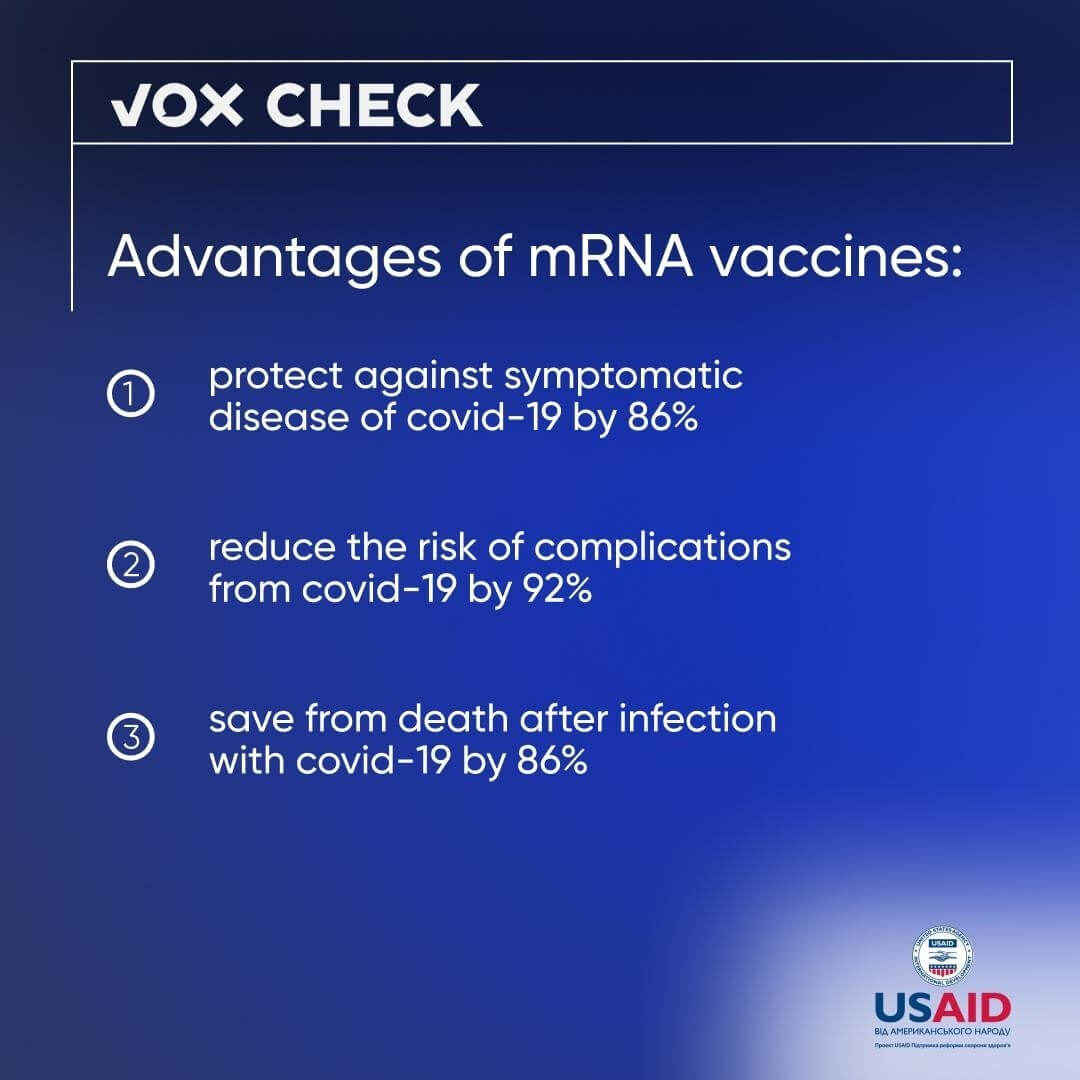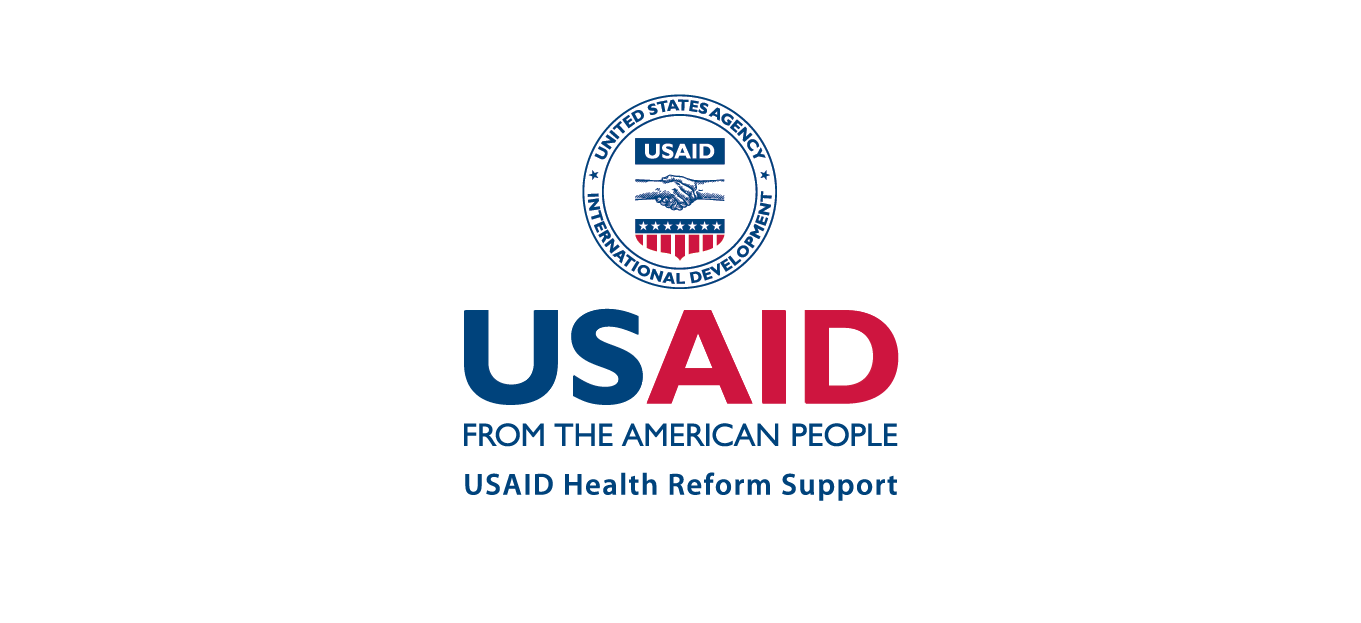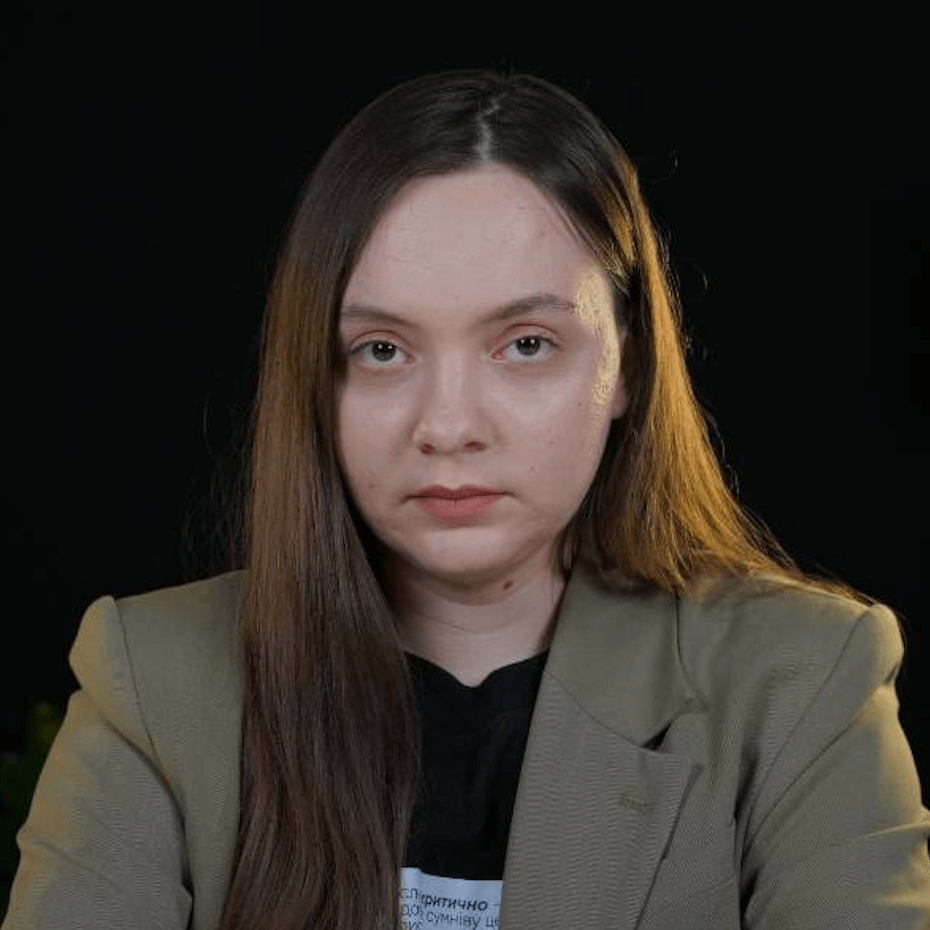COVID-19 continues to spread in Ukraine, and with it — informational attacks that undermine trust in vaccination. This week, users have been spreading a fake of Russian Ministry of Defense that allegedly the US has been working on mRNA vaccines that can cause new diseases since 2017. Information was also spread on the network that artificial intelligence had created a vaccine against the coronavirus. So users are worried whether it has not put a mechanism of “self-destruction of cells” in the vaccine after injection.
With the support of the USAID Health Reform Support project, VoxCheck analyzes and refutes public health narratives spread in the information space of Ukraine, Belarus, and russia on a weekly basis.
Disinformation: The US has been developing mRNA vaccines that cause disease and serious complications
This time, the Ministry of Defense of the Russian Federation reports that since 2017, the USA has allegedly been developing mRNA vaccines that cause diseases and serious complications. The reports refer to the statement of Karen Kingston, a former employee of the American pharmaceutical company Pfizer. She stated that mRNA vaccines are a type of “biological weapon.”
What’s the reality?
Karen Kingston worked at Pfizer from 1996 to 1998. She repeatedly spread fakes about vaccines against COVID-19. For example, she said that vaccines are biological weapons, and Pfizer-BioNTech and Moderna drugs are toxic because they contain graphene oxide. This is not true: none of the Pfizer-BioNTech and Moderna vaccines contain graphene oxide.
mRNA vaccines help prevent infection with COVID-19. There are currently two approved mRNA vaccines: Pfizer-BioNTech and Moderna. The main difference between mRNA vaccines and others is that they do not contain the virus or its parts. mRNA vaccines are a kind of “instruction” for the body. That is, the mRNA vaccine triggers the immune system to create antibodies and thus teaches the body to produce the protein. In turn, the produced protein fights the virus. Also, mRNA vaccines do not penetrate DNA cells and cannot affect our genes.
The thesis that the US has been developing mRNA vaccines since 2017 is also false. In fact, mRNA technology is not new. Scientists discovered it back in 1961. In particular, scientists studied how mRNA can activate or block protein production in the body. The first mRNA vaccine was tested on mice in 1990. An mRNA vaccine against rabies was tested in humans in 2013 and during the Ebola virus in 2014-2015. Also, before the COVID-19 pandemic, scientists wanted to use mRNA vaccines to treat cancer and conducted research on these vaccines. The developers of coronavirus vaccines relied on the experience of developing an mRNA vaccine against cancer.
mRNA vaccines do not cause such serious complications as meningitis, acute myocardial infarction, or stroke, as reported by the Ministry of Defense of the Russian Federation. Among the side effects of the Pfizer-BioNTech and Moderna vaccines is an allergic reaction. It can be shown up by dizziness, shortness of breath, swelling of the face or throat (as a sign of anaphylaxis) or rashes on the body. Rarely, myocarditis or pericarditis, characterized by chest pain or palpitations, also occurs. However, even these reactions happen infrequently.
Allergic reactions occur in only 4.7 cases per million vaccinations with the Pfizer-BioNTech vaccine and 2.5 cases per million vaccinations with Moderna, according to the US Vaccine Adverse Reactions Study. Cases of myocarditis or pericarditis after vaccination were also rare and mostly occurred in men aged 18–25 years after the second dose of vaccine.
On February 28, 2023, The Lancet published an article reviewing randomized controlled trials of the effectiveness of vaccines against COVID-19 in 2020-2022. mRNA vaccines have demonstrated high efficacy: protection against symptomatic disease of COVID-19 by 85.5%, reduction of risk of complications from COVID-19 by 91.5%, and reduction of risk of death after infection with COVID-19 by 85.8%.
Source: medical journal The Lancet
mRNA vaccines are also available in Ukraine. On the website of the State Expert Center of the Ministry of Health of Ukraine, you can view weekly reports on the results of monitoring the safety of the use of vaccines against COVID-19. The most common side effects after vaccination — fever, fatigue, chills, redness, pain and swelling at the injection site, and headache — pass quickly and do not threaten health. Also, some people may have absolute or temporary contraindications to vaccination. You can find out more about them on the website of the Ministry of Health.
Misinformation: Artificial intelligence created a universal vaccine against COVID-19
The news under the heading “Artificial intelligence has created a new universal vaccine against all strains of the coronavirus” is spreading on the network. Users are concerned that with relative autonomy, AI may decide to harm humans. For example, to put in the vaccine a mechanism of self-destruction of cells some time after the injection.
Screenshot of the post
What’s the reality?
Users are misled by the manipulative headline of the news. Researchers at MIT, the University of Texas, Boston University, Tufts University, Massachusetts General Hospital, and Acuitas Therapeutics are working on the new vaccine, not artificial intelligence. Scientists announced this on March 9, 2023 on the website of the Massachusetts Institute of Technology. It is about the development of the mRNA-LNP vaccine (MIT-T-COVID), which is an improved version of the mRNA vaccine. It activates the release of “virus-killing” T-cells, not neutralizing antibodies, as in the case of standard mRNA vaccines.
T-lymphocytes are white blood cells that specialize in detecting virus-infected cells. Antibodies, for their part, specialize in detecting free viruses in the body.
Machine learning algorithms are used by researchers to determine which SARS-Cov-2 peptides should be included in the vaccine. This involves sifting through the thousands of peptides in the virus to retain only about 30. The main goal is to select peptides that are conserved in all strains of the virus and are associated with HLA (human leukocyte antigen) molecules. These molecules are located on the surface of the cell membrane and bind peptide fragments of foreign proteins and present them to T-lymphocytes. Without HLA molecules, the induction of cellular immunity is impossible. Such an approach should correct the main drawback of standard mRNA vaccines — the formation of a limited immune response that does not cover all strains of COVID-19.
Experimental verification of the theory took place on the basis of the University of Texas. The vaccine was tested on mice. As a result, a strong immune response was received, which is considered the first experimental evidence of the effectiveness of this type of vaccine. There are still several stages of experimental research and clarification of theoretical developments ahead, so there is no talk of releasing such a vaccine yet.
Artificial intelligence in the form of machine learning algorithms is used only for the development of the theoretical part, humans are responsible for the finalized vaccine formula and its manufacture. In addition, this is not the first case of optimization of the vaccine development process at the expense of machine technologies. Thus, the Moderna company used and is using artificial intelligence in its work on the mRNA vaccine. So concerns about possible “malicious intent” on the part of artificial intelligence are unfounded.
COVID-19 continues to spread in Ukraine, so vaccination remains relevant. The Ministry of Health of Ukraine reminds that vaccination against COVID-19, in particular booster vaccinations, is available to all who wish. You can find the addresses and contacts of vaccination points against COVID-19 on the website list.covid19.gov.ua.
This information piece was produced with the assistance of the United States Agency for International Development (USAID), provided on behalf of the people of the United States of America. This article’s content, which does not necessarily reflect the views of USAID, the United States Government, is the sole responsibility of Deloitte Consulting under contract #72012118C00001.
Attention
The authors do not work for, consult to, own shares in or receive funding from any company or organization that would benefit from this article, and have no relevant affiliations






